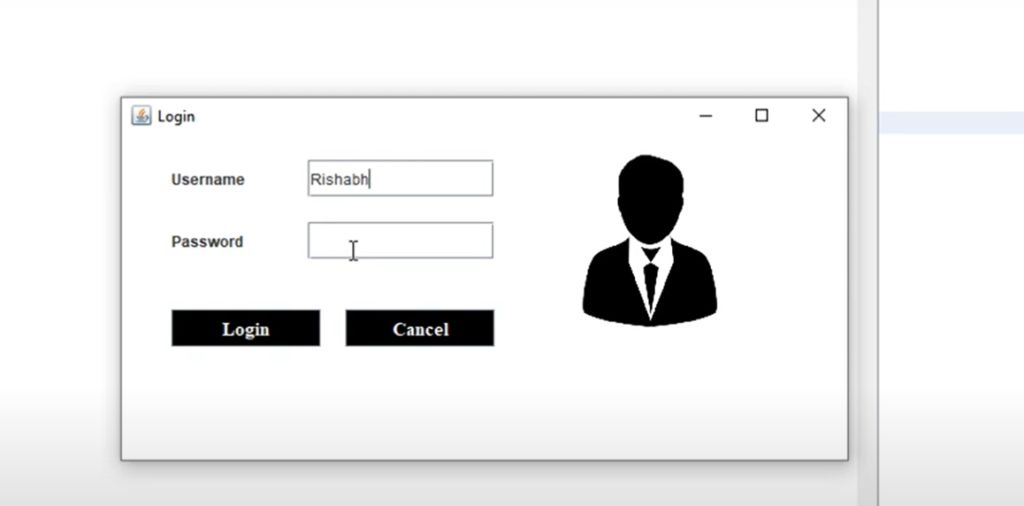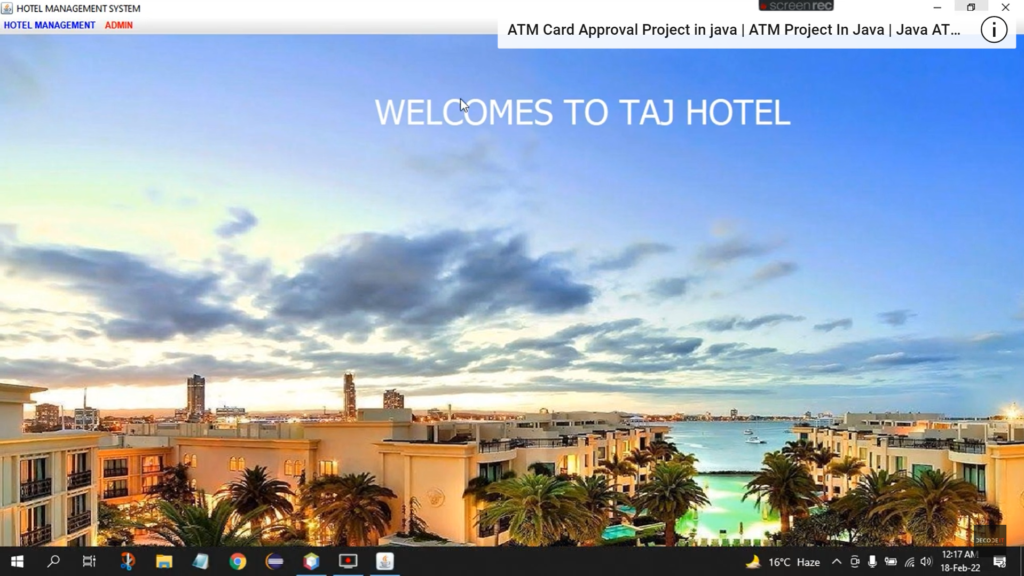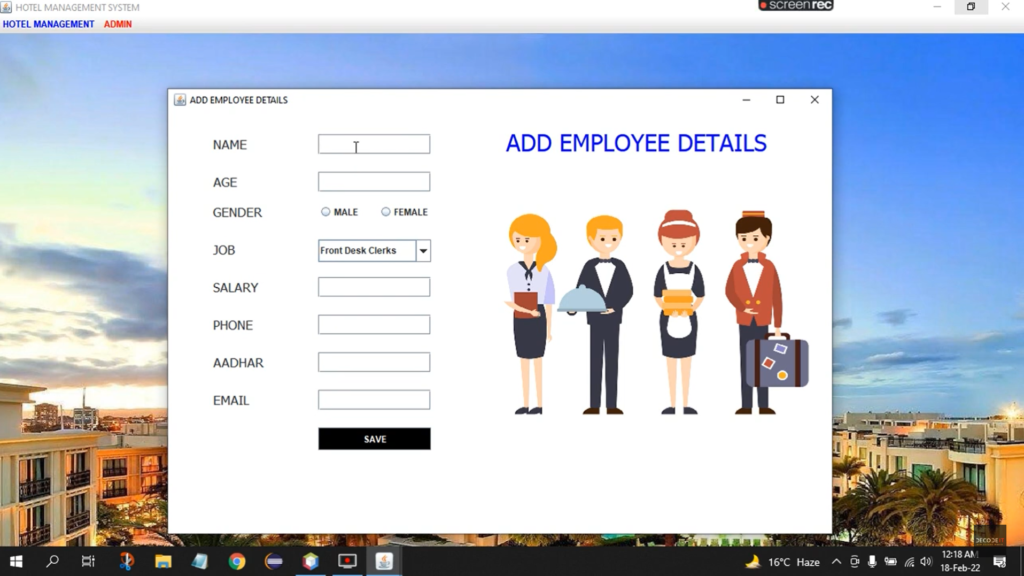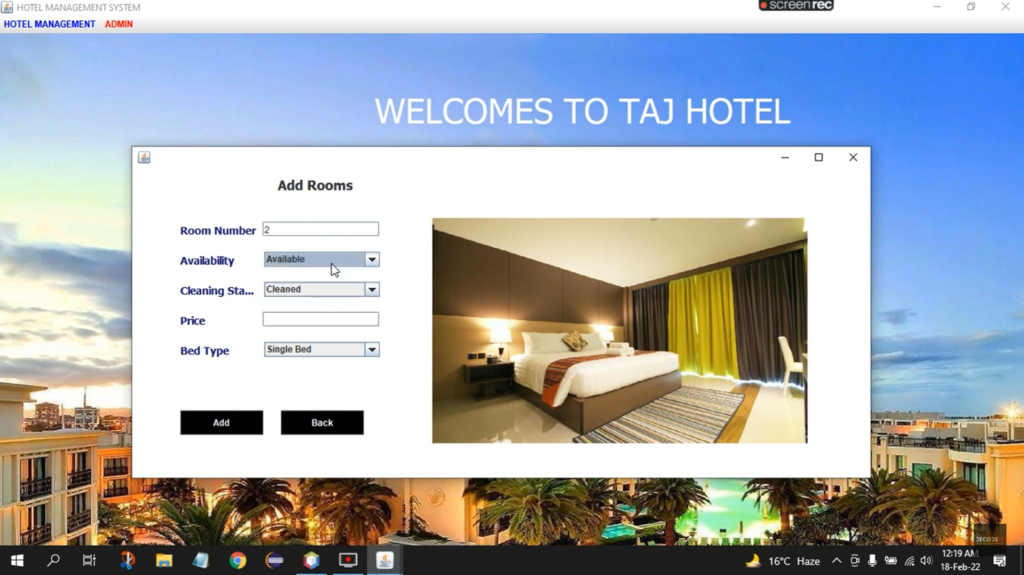Hotel Management System in Java
In the hotel industry, things like fast service, happy customers, and smooth work are really important. A Hotel Management System (HMS) is software that helps run hotel tasks like booking rooms, check-in/check-out, housekeeping, and billing.For students or developers, making a Hotel Management System using Java is a great project idea. In this guide, we’ll look at what HMS is, why Java is a good choice for it, and what main features it should have.
Why Choose Java for a Hotel Management System?
Java is one of the most widely-used programming languages, valued for its platform independence, scalability, and rich ecosystem of libraries and frameworks. For a hotel management system, Java provides several advantages:
- Platform Independence: Java’s Write Once, Run Anywhere (WORA) capability allows developers to deploy the system across various devices and operating systems, making it ideal for hotels with diverse technological infrastructures.
- Robust Security: Hospitality management involves handling sensitive customer data, and Java’s robust security features help ensure data protection and system integrity.
- Scalability: As a hotel grows, its HMS needs to scale up. Java’s object-oriented structure and enterprise-level support make it easier to expand functionality as the business needs evolve.
- Community Support and Resources: Java has a vast community of developers and a comprehensive collection of libraries, making it easier to find resources, troubleshoot, and innovate within the language.
Key Components
Developing a hotel management system requires attention to several core features that address the operational and customer-service needs of a hotel. Here’s an overview of the main components:
1. Booking and Reservation Management
This is the heart of any hotel management system. A booking module should handle room availability, customer preferences, pricing, and reservation statuses. Ideally, it includes a real-time calendar that updates whenever a new reservation is made, ensuring double bookings are avoided. The reservation feature should also integrate with third-party platforms if the hotel lists rooms on external booking sites.
2. Customer Check-in and Check-out
A streamlined check-in and check-out process is essential for customer satisfaction. This module should enable receptionists to view reservation details, allocate rooms, and capture any additional information from guests during check-in. At check-out, it calculates any extra charges (such as room service or extended stay) and finalizes the billing process.
3. Room Management
Room management functionality tracks the status and availability of each room, whether it’s booked, occupied, or undergoing maintenance. This helps the staff stay informed and ensures that guests are always assigned to clean, well-maintained rooms.
4. Housekeeping Management
An effective HMS will include a housekeeping module that enables staff to mark rooms as “clean,” “in progress,” or “requires maintenance.” This keeps the housekeeping staff updated on room statuses and ensures a seamless experience for arriving guests.
5. Billing and Invoice Generation
Billing is another crucial part of an HMS. A well-designed billing system will support multiple payment options, itemized billing for services (such as food, laundry, or extra amenities), and automated invoice generation for both physical and digital records.
6. Inventory Management
For hotels that offer room service, laundry, or other amenities, tracking inventory is essential. This module can track the stock of consumables (like linens or toiletries), food and beverage inventory, and notify management when items need restocking.
7. Reports and Analytics
Data insights play a major role in hotel management today. The system should be able to generate reports on room occupancy rates, revenue, customer demographics, and other critical metrics. These insights enable hotel managers to make informed decisions, understand trends, and strategize for growth.
8. User Roles and Permissions
To maintain security and streamline operations, the HMS should support different user roles, such as administrators, receptionists, housekeeping staff, and kitchen staff. Each role can be assigned specific permissions, ensuring that users have access only to the modules they need.
Download New Real Time Projects :-Click here
Development Considerations and Best Practices
Developing a hotel management system requires careful planning, especially regarding design and architecture. Here are some best practices to consider:
- Modular Architecture: Breaking down the HMS into modules (e.g., booking, billing, housekeeping) promotes flexibility, making it easier to update or scale individual components.
- User-Friendly Interface: The success of an HMS largely depends on its ease of use. A clear, intuitive interface is essential for hotel staff who may not have technical expertise. Consider including dashboards and straightforward navigation for each module.
- Database Management: Reliable data storage is essential for managing reservations, customer data, and inventory. A relational database like MySQL or PostgreSQL is ideal for handling structured data, while NoSQL databases can be explored for more dynamic data storage needs.
- Integrating APIs: To expand functionality, the system can leverage APIs for payments, inventory tracking, or even customer relationship management (CRM) tools. For hotels partnering with travel agencies, integration with third-party booking platforms through APIs will ensure that bookings remain up-to-date across systems.
- Testing and Error Handling: Rigorous testing is critical, particularly for a system with financial transactions and customer data. Make sure to implement thorough unit tests and error handling to provide a smooth user experience even when issues arise.
https://updategadh.com/category/php-project




Contact Us to Get the Source Code:
If you need the source code for the Hotel Management System in Java, feel free to reach out through any of the provided contact methods.
- Remotely Setup Project.
- The Full project files
- Database.
- Step-by-step configuration tutorial.
hotel management system in java with source code hotel management system in java pdf hotel management system in java example hotel-management system project in java github hotel management system project in java and mysql hotel management system in java swing hotel management project in java with source code free download hotel management system in java geeksforgeeks
🎓 Need Complete Final Year Project?
Get Source Code + Report + PPT + Viva Questions (Instant Access)
🛒 Visit UpdateGadh Store →